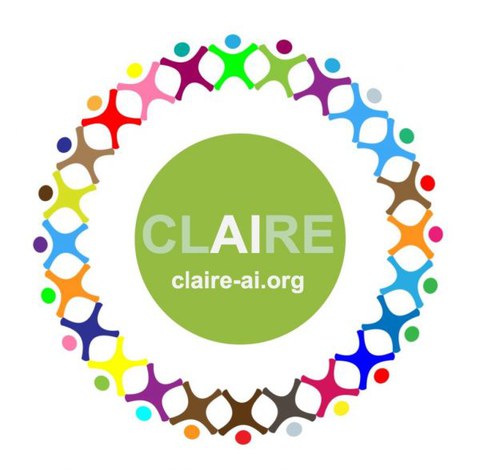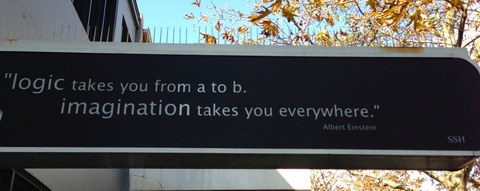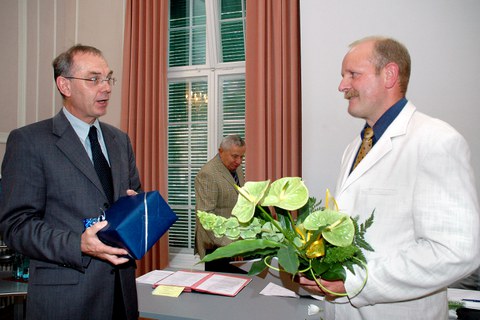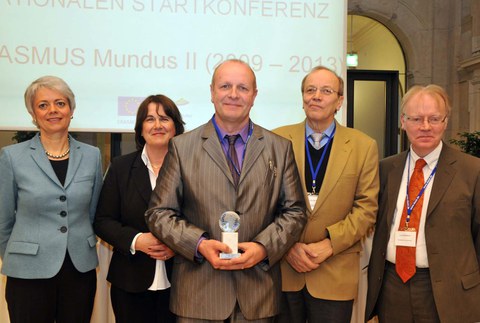Professor
Prof. Dr. Steffen Hölldobler starb nach langer schwerer Krankheit am 09.05.2023. Wir betrauern den Verlust eines geschätzten Kollegen und engagierten Lehrers. Er war Leiter der Arbeitsgruppe Wissensverarbeitung.
Forschungsbereiche
Logik und Deduktion, Logik-basierte Wissensverarbeitung, Logik und Kognition, Logik und konnektionistische Systeme.
Akademischer Werdegang (auf Englisch)
After graduating in Computer Science Steffen Hölldobler joined Alan Robinson's Logic Programming Research Group at the Syracuse University, USA, as a visiting research associate in 1983. During this visit he became interested in the combination of logic and functional programming. Focusing on equational logic programming he received a Dr.rer.nat. from the University of the Federal Armed Forces at Munich, Germany, in 1988.
Shortly afterwards he joined Wolfgang Bibel's Intellectics group at the TU Darmstadt, Germany. Coming across various approaches on planning he developed a new calculus for deductive planning based on an equational logic together with Josef Schneeberger. This approach has been further developed. It is now known under the name FLUENT CALCULUS and is regarded as one of the major approaches in the area of reasoning about situations, actions and causality.
In 1989 he was offered a one-year fellowship as a postdoc at the International Computer Science Institute (ICSI) at Berkeley, USA. There he was introduced to connectionism by Jerry Feldman. His research at the ICSI finally led to a postdoctoral thesis (Habilitation) on Automated Inferencing and Connectionist Models in 1993. Based on this thesis he developed the so-called CORE method for translating semantic operators associated with logic programs into connectionist networks jointly with Yvonne Kalinke.
In the same year he became Professor for Knowledge Representation and Reasoning in the Computer Science Department at the Technische Universität Dresden. His research interests include logic and deduction, logic programming, knowledge representation and reasoning as well as connectionism. Recently he has developed a new, multi-valued, non-monotonic logic paradigm for human reasoning, the WEAK COMPLETION SEMANTICS.
He is the author of four monographs, more than 100 scientific articles, and has edited more than 30 publications.
He is also assigned to the North Caucasus Federal University in Stavropol, Russian Federation, as a guest professor.
Rollen
- Leiter der Arbeitsgruppe Wissensverarbeitung
- Vorsitzender des Nominierungsausschusses für den Dissertationspreis der Gesellschaft für Informatik e.V.
Einige Links
Ausgewählte Publikationen
- Foundations of Equational Logic Programming. Lecture Notes in Artificial Intelligence 353: 1989
------ meine Dissertation
- A New Deductive Approach to Planning. New Generation Computing 8, 225-244: 1990 (together with Josef Schneeberger)
------ die erste Arbeit zum fluent calculus
- Towards a New Massively Parallel Computational Model for Logic Programming. In: Proceedings of the ECAI94 Workshop on Combining Symbolic and Connectionist Processing, 68-77: 1994 (together with Yvonne Kalinke)
------ die erste Arbeit zur neuronalen-symbolischen Integration und der core method
- Logik und Logikprogrammierung. Band 1: Grundlagen. Synchron Publishers, Heidelberg: 2009
------ mein Textbuch zur Logik
- Logik und Logikprogrammierung. Band 2: Aufgaben und Lösungen. Synchron Publishers, Heidelberg: 2011(together with Sebastian Bader, Bertram Fronhöfer, Ursula Hans, Pascal Hitzler, Markus Krötzsch und Tobias Pietzsch)
------- viele Übungen mit Lösungen zur Logik
- Logic Programs under Three-Valued Lukasiewicz's Semantics. Lecture Notes in Computer Science 5649, 464-478: 2009 (together with Carroline D. P. Kencana Ramli)
------ die erste Arbeit zur weak completion semantics
- A Computational Logic Approach to Human Syllogistic Reasoning. In: Proceedings of the 39th Annual Conference of the Cognitive Science Society, 883-888: 2017 (together with Ana Oliviera da Costa, Emmanuelle-Anna Dietz Saldanha, and Marco Ragni).
------ die weak completion semantics ist besser als 12 kognitive Theorien
Alle Publikationen finden sich in Research Gate
Awards
- Lehrpreis 2004 der Gesellschaft von Freunden und Förderern der TU Dresden e.V. für sein innovatives, international vernetztes Lehrkonzept zur Einführung, Ausgestaltung und Durchführung des Internationalen Masterstudienganges Computational Logic
- Dresden Congress Award 2006 für die ICCL Sommerschule Logic-Based Knowledge Representation
- Erasmus Mundus Award 2009 des DAAD für das European Master's Program in Computational Logic
- Dresden Congress Award 2016 für die ICCL Sommerschule Reasoning
Projekte siehe englische Version




